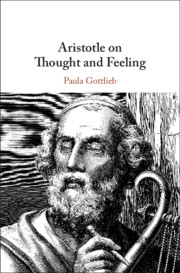Book contents
- Aristotle on Thought and Feeling
- Aristotle on Thought and Feeling
- Copyright page
- Dedication
- Contents
- Acknowledgments
- Abbreviations
- Introduction
- 1 The Psyche
- 2 Aristotelian Feelings
- 3 Developing Thought and Feeling
- 4 Aristotelian Choice
- 5 Akrasia
- 6 Thoughtfulness and Feelings
- 7 To Kalon and Music
- Conclusion
- Glossary of Key Terms
- References
- General Index
- Index Locorum
Conclusion
Published online by Cambridge University Press: 08 January 2021
- Aristotle on Thought and Feeling
- Aristotle on Thought and Feeling
- Copyright page
- Dedication
- Contents
- Acknowledgments
- Abbreviations
- Introduction
- 1 The Psyche
- 2 Aristotelian Feelings
- 3 Developing Thought and Feeling
- 4 Aristotelian Choice
- 5 Akrasia
- 6 Thoughtfulness and Feelings
- 7 To Kalon and Music
- Conclusion
- Glossary of Key Terms
- References
- General Index
- Index Locorum
Summary
I have argued that according to Aristotle it is not possible to have the correct thought without the correct feelings and conversely. As he says, virtue of character and thoughtfulness are yoked together. One achieves the correct interdependence of thought and feeling by developing both at the same time, not one after the other. Metaphorically speaking, the culmination is a musical soul disposed to allow one to act in a thoughtfully ethical way. The motivation of such a soul is prohairetic. Contrary to Elizabeth Anscombe’s contention, “prohairetic” should be in our vocabulary after all.
- Type
- Chapter
- Information
- Aristotle on Thought and Feeling , pp. 143 - 146Publisher: Cambridge University PressPrint publication year: 2021

